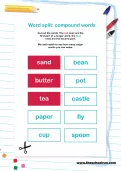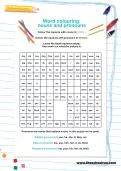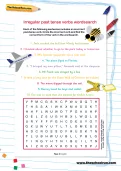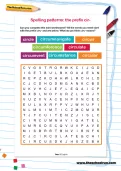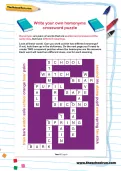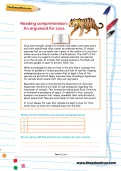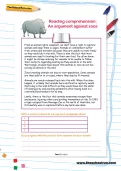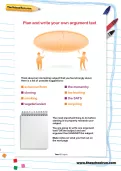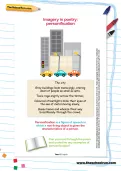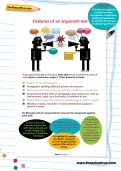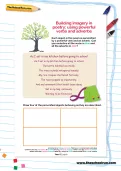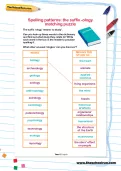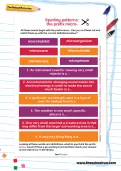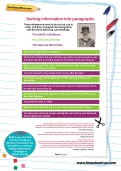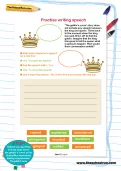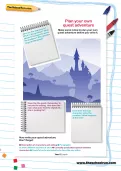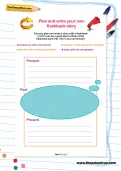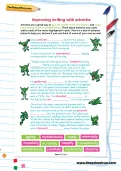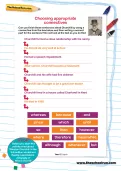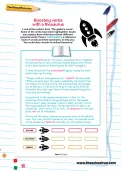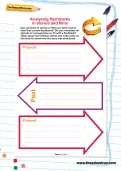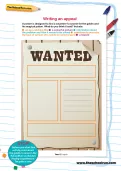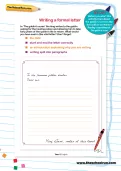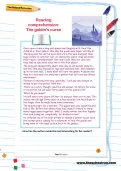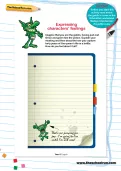A zoos a good place for animals to live or not. Here is an argument for zoos. Read it and see if you agree with the writer's viewpoint or not.
or
Register to add to your saved resources
Do you think zoos are a good thing? Read this interesting argument against zoos and see if you agree with the writer's opinion or not.
or
Register to add to your saved resources
Already a subscriber? to view this content.
Think about an interesting subject that you feel strongly about. You are going to write one argument text FOR the subject and one argument text AGAINST the subject. Start by doing some research
or
Register to add to your saved resources
Already a subscriber? to view this content.
Personification is a figure of speech in which a non-living object is given the characteristics of a person. Can you read through this poem and underline any examples of personification then have a go at writing your own personification poem?
or
Register to add to your saved resources
Already a subscriber? to view this content.
Argument texts are non-fiction texts that show someone’s point of view about a particular subject. Go through both 'An argument for zoos' and 'An argument against zoos' and see if you can answer these questions.
or
Register to add to your saved resources
Already a subscriber? to view this content.
Each object in this poem is personified by a powerful verb and an adverb. Can you underline all the verbs in blue and all the adverbs in pink? Then draw four of the personified objects behaving as they are described.
or
Register to add to your saved resources
Already a subscriber? to view this content.
The suffix ‘ology’ means ‘to study’. Can you look up these words in the dictionary and find out what study they relate to? Write each word in the box in the middle to practise spelling it. What other unusual ‘ologies’ can you discover?
or
Register to add to your saved resources
Already a subscriber? to view this content.
All these words begin with the prefix micro-. Can you cut them out and match them up with the correct definitions? Looking at these words and definitions, what do you think the prefix micro- means? Have a go working it out and then check your answer on the internet or in the library.
or
Register to add to your saved resources
Already a subscriber? to view this content.
How good are you at sorting information? Can you cut out these statements, put them in order and then arrange them into paragraphs?
or
Register to add to your saved resources
Already a subscriber? to view this content.
‘The goblin’s curse’ story does not include any speech between the king and queen. Think back to the moment when the king has sent Orion off to find the goblin. Imagine that the king has gone to tell the queen what is going to happen. How would their conversation unfold?
or
Register to add to your saved resources
Already a subscriber? to view this content.
Make some notes to plan your own quest adventure before you write it. Who are the characters? What is the problem? What needs to be found to solve the problem? Who decides to go on the quest? Now write up your quest adventure, but don’t forget: description of characters and setting; paragraphs to show different sections of story; correctly punctuated speech between characters; powerful verbs and adverbs to describe any action.
or
Register to add to your saved resources
Already a subscriber? to view this content.
Can you plan and write a story with a flashback in it? It may be a good idea to think of the flashback part first. See if you can include: sentences with connectives; speech with correct punctuation; mention of the character’s feelings; texts split into paragraphs.
or
Register to add to your saved resources
Already a subscriber? to view this content.
Adverbs are a great way to give the reader more information and make your writing much more interesting. Think about adverbs you could add to each of the verbs highlighted in pink. There is a box of adverbs to help you, but see if you can think of some of your own as well.
or
Register to add to your saved resources
Already a subscriber? to view this content.
Can you finish these sentences about Winston Churchill by using a connective from the box and then writing a second part for the sentence? Do not look at the text as you do this!
or
Register to add to your saved resources
Already a subscriber? to view this content.
Look at this extract from ‘The goblin’s curse’. Some of the verbs have been highlighted. Could you replace them with two or three different, powerful verbs? Use a THESAURUS, a reference book of words and their synonyms, to help you. You could also consult an online thesaurus!
or
Register to add to your saved resources
Already a subscriber? to view this content.
Can you think of stories or films you have read or seen that contain flashbacks? Do you remember an episode of a programme on TV with a flashback? Think about one of these stories and write notes on this sheet to show how the story was structured.
or
Register to add to your saved resources
Already a subscriber? to view this content.
A poster is designed to find a volunteer to search for the goblin and his magical potion (from the story 'The goblin's curse'). What do you think it said? Include: an eye-catching title; a colourful picture; information about the problem and how it needs to be solved; adjectives to describe the type of person who needs to come forward; a reward.
or
Register to add to your saved resources
Already a subscriber? to view this content.
Read ‘The goblin’s curse’ first, then think about the letter that the king writes to the goblin asking for the healing potion. What would you have said in this vital letter? Don’t forget how to set out a letter correctly.
or
Register to add to your saved resources
Already a subscriber? to view this content.
A KS2, Year 6 reading comprehension worksheet created by an experienced teacher for your child to practise at home.
or
Register to add to your saved resources
Already a subscriber? to view this content.
Once you've read the story of The Goblin's Curse, imagine that you are the goblin, having just met Orion and given him the potion. Explain your meeting and then describe how you capture forty years of the queen’s life in a bottle. How do you feel about it all?
or
Register to add to your saved resources
Already a subscriber? to view this content.
